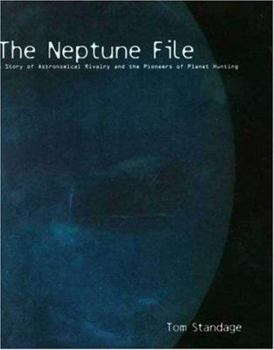The Neptune File: A Story of Astronomical Rivalry and the Pioneers of Planet Hunting
Select Format
Select Condition 
Book Overview
Now in paperback, The Neptune File is the first account of the dramatic events surrounding the discovery of the solar system's eighth planet, and the story of two men who were able to see on paper... This description may be from another edition of this product.
Format:Hardcover
Language:English
ISBN:0802713637
ISBN13:9780802713636
Release Date:October 2000
Publisher:Walker Books
Length:256 Pages
Weight:1.00 lbs.
Dimensions:1.0" x 6.0" x 8.3"
Customer Reviews
5 ratings
A fun read for astronomy fans
Published by Thriftbooks.com User , 18 years ago
I read this to my son a couple years ago (when he was 10), and we both really enjoyed it. I had been reading it myself, but decided to read the opening chapter to him and he was hooked. The process of "finding" Neptune gave perspective to our own backyard endeavors with a simple refractor telescope.
History of mathematical planetary astronomy
Published by Thriftbooks.com User , 22 years ago
I devoured this book in three big bites. From the shockingly superior optics of William Herschel to the elegant mathematics of John Couch Adams to the extra-solar planets discovered in the late 1990s to the techniques being now developed to find planets orbiting other stars -- its all fascinating. In the end, most of what you thought watching Star Trek had taught you about distant worlds is sacked. "The idea that planetary systems around other stars will be broadly similar to our own solar system is no longer tenable. Indeed, as more planets are discovered, it is our solar system itself that starts to seem more and more unusual."If you don't read science books and don't know why anybody would, this book might change your mind. Highly recommended.
Terrific Discovery. (And I'm talking about the book!)
Published by Thriftbooks.com User , 23 years ago
I actually picked up this book in a used bookstore and read the back cover. The facts surrounding the discovery of the planet were new to me. (Kind of embarrassing really that I had never heard it before. Remind me to contact the secondary school I attended!!) In any event, I was enamored by the discriptions on the back cover and bought it for around four or five bucks. I read it in less than a day, which for me is an extreme rarity. I usually spend my time in the "shallow end" of the literary pool, reading books that can only be described as "easy" reads. This is one of the most entertaining books I've read in years. Unfortunately, I lent the book to someone who had more of a background in astronomy who must have known the book's true value and I haven't seen the book (or the guy) since. So I'm back here to purchase another copy. This time I am much more certain of my investment.
Amazing Read - Insightful!
Published by Thriftbooks.com User , 23 years ago
This book is not only a very good historical look at the mathematical calculation and theory that went into pinpointing the then unseen planet Neptune, Tom Standage has written an exciting and thought provoking narrative. As fans of Jon Krakauer's Everest and climbing exploits can attest, the storytelling can be as important as the story.This book weaves intrigue, greed and arrogance into the telling of the history, thus avoiding the publication of a "dry" account of some very historical events. Not only does this bring the reader closer to the emotions and ambience of the times, it opens the subject to a broader audience. Though an astronomy buff myself, this is a book anyone with in interest in science and human drama could enjoy.In other words, this is a great read and I was somewhat saddened when it ended. I might have to go through several more books before I find another one as well written and enjoyable as the Neptune File.
Institutional Science
Published by Thriftbooks.com User , 23 years ago
This book is a story of scientific prediction and discovery. It also is a lesson on the workings of institutional science.A Cambridge mathematician calculates the position of an undiscovered planet, now known as Neptune. He submits his predictions to the director of the Cambridge Observatory. The Cambridge director, not wanting to take a chance on looking for a planet based solely on calculations, sends the mathematician to the director of the Greenwich Observatory. The Greenwich director, too busy with his mission, sends the mathematician back to the Cambridge Observatory. The directors spend endless weeks exchanging letters (the 19th century equivalent of e-mail) on why each should or should not look for the planet, seemingly oblivious to the opportunity that has been given to them. Meanwhile, a French mathematician also calculates the position of the planet. Going around the powers-that-be, he asks a contact at the Berlin Observatory, an assistant, to have a look for the planet. The German astronomer and a friend find the planet in a few hours. The English establishment is left with a lot of explaining to do.How far have we come in the last 150 years? The only lesson is that we never learn our lesson.





